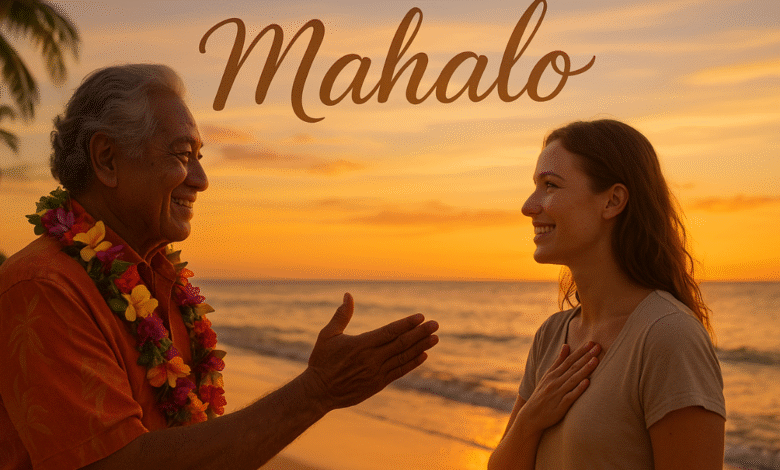Mahalo Meaning: A Deep Dive into the Spirit of Aloha

Discover the true mahalo meaning beyond “thank you.” Explore its cultural roots, spiritual depth, and everyday uses in Hawaiian life.
Understanding the phrase mahalo meaning goes beyond a simple dictionary definition. This Hawaiian word carries with it centuries of cultural values, traditions, and a unique worldview that makes Hawaii one of the most welcoming and heart-centered places in the world. When someone says “mahalo,” they’re not just saying “thanks.” They are expressing respect, gratitude, appreciation, and even love.
To many visitors, hearing the word for the first time is simply part of the island experience—something printed on signs, trash cans, and menus. But to locals, the mahalo meaning holds far deeper weight. It is a reflection of the Hawaiian spirit of giving and receiving, of showing kindness, and of honoring the connection between people and the world around them.
The Origins of Mahalo Meaning
The Hawaiian language is rich with words that embody entire philosophies, and mahalo is one of its most cherished. Linguists believe the roots of the word stem from Proto-Polynesian origins, connecting Hawaiian with other island languages across the Pacific. While it is most commonly translated as “thank you,” its cultural foundation is far more profound.
Unlike English, where “thank you” is often a reflex, mahalo was historically spoken with a deep awareness of one’s heart. Ancient Hawaiians used it not only for expressing gratitude but also to acknowledge blessings, nature, and spiritual guidance. In this way, the mahalo meaning is tied to a spiritual exchange, one that recognizes the giver, the gift, and the interconnectedness of all things.
Everyday Uses of Mahalo
When you walk through Hawaii, you’ll hear mahalo in countless situations. Locals might say it at the grocery store, restaurants will print it on receipts, and you’ll see it on signs as a way to encourage respect.
For example, many trash cans have the phrase “Mahalo for keeping our island clean.” This isn’t just a polite reminder—it’s a cultural invitation. The mahalo meaning in this context is about showing gratitude for protecting the land. It links environmental stewardship with personal responsibility, turning something simple into a shared act of care.
At the same time, when locals say mahalo in conversation, it’s not just a word of thanks. It carries warmth, sincerity, and often a smile. It transforms ordinary interactions into moments of connection, reinforcing the Hawaiian way of valuing relationships.
Mahalo vs. Other Hawaiian Phrases
People often confuse mahalo with other Hawaiian expressions, especially when first learning the language. While “aloha” is the most famous Hawaiian word, its meaning centers on love, compassion, and presence. Mahalo, on the other hand, is more specific—it’s about gratitude.
Some visitors also assume that “mahalo” means “trash” because of the signs they see on garbage bins. This is a humorous yet common misunderstanding. In truth, the placement of mahalo on waste containers is a polite way of thanking people for keeping the islands clean.
In Hawaiian culture, even small words are infused with deeper meaning. That is why understanding mahalo meaning helps one avoid misinterpretation and develop a real appreciation for the language.
Cultural Significance of Mahalo
The mahalo meaning is not just about etiquette—it’s tied to Hawaiian values known as aloha ʻāina (love of the land) and malama ʻohana (care for family). Gratitude in Hawaii extends far beyond people; it includes the environment, ancestors, and spiritual elements.
When Hawaiians say mahalo, they are also affirming balance and harmony. For instance, a fisherman might say it to the ocean after a successful catch, showing respect for nature’s gift. A family might say it during prayer, honoring ancestors who provide blessings. This cultural practice demonstrates that mahalo is about reciprocity: when you give thanks, you also give back.
The act of living with gratitude shapes Hawaiian identity. It reinforces humility, respect, and compassion—values that outsiders often feel immediately upon visiting the islands.
Misunderstandings About Mahalo
Many tourists approach the mahalo meaning from a purely surface level. They see it as equivalent to “thank you” without realizing the emotional depth it carries. Some even use it playfully or sarcastically, not recognizing its cultural importance.
This can sometimes come across as disrespectful to locals who treasure the word. That’s why cultural sensitivity matters. To use mahalo authentically, one should do so with sincerity, humility, and awareness. When spoken with the right intention, the word bridges cultural gaps and fosters genuine connection.
Mahalo in Hawaiian Spirituality
In traditional Hawaiian spirituality, gratitude was not just a polite exchange—it was a vital practice. The mahalo meaning had ties to rituals, chants, and offerings to the gods. People gave thanks for rain, harvests, safe voyages, and healing. Saying mahalo was an acknowledgment of life’s sacredness.
Even today, many Hawaiians still integrate mahalo into prayer or meditation. They believe gratitude opens the heart, allowing more blessings to flow. In this sense, mahalo becomes a living reminder that words hold energy and intention.
How Tourists Can Embrace Mahalo
For visitors, learning the mahalo meaning is an opportunity to engage respectfully with Hawaiian culture. It’s not about adopting slang for fun—it’s about aligning with the island’s spirit. Using mahalo sincerely when thanking locals, appreciating nature, or reflecting on one’s travel experience can be a small but powerful gesture.
Here’s a simple table to illustrate when and how to use mahalo:
| Situation | Example Usage | Cultural Meaning |
|---|---|---|
| Thanking someone at a store | “Mahalo for helping me find this” | Politeness and respect |
| Respecting the land | “Mahalo for keeping the beach clean” | Stewardship of nature |
| Expressing gratitude during a meal | “Mahalo for preparing this food” | Appreciation for effort |
| Spiritual reflection | “Mahalo for today’s blessings” | Connection to the divine |
This kind of mindful approach transforms the visitor’s experience. Instead of just observing Hawaii, they become part of its living culture.
Mahalo in Modern Media and Pop Culture
Interestingly, the mahalo meaning has made its way into films, books, and even corporate branding. Some companies use it to create a sense of friendliness and island authenticity. While this helps spread awareness, it can sometimes water down the word’s cultural richness.
In movies or TV shows set in Hawaii, characters often say “mahalo” to emphasize the setting. While this adds flavor, it can also risk stereotyping if not done with cultural respect. Nevertheless, such exposure keeps the word alive and sparks curiosity for people to learn more about Hawaiian traditions.
Quotes on Gratitude and Mahalo
Because the mahalo meaning is so closely tied to gratitude, it resonates with global wisdom. Consider these quotes that align with the spirit of mahalo:
- “Gratitude is not only the greatest of virtues but the parent of all others.” – Cicero
- “Feeling gratitude and not expressing it is like wrapping a present and not giving it.” – William Arthur Ward
- “Mahalo is more than a word; it is a lifestyle of giving thanks.” – Hawaiian Proverb
These quotes show how the mahalo meaning bridges Hawaiian culture with universal human values.
FAQs on Mahalo Meaning
What does mahalo mean in Hawaiian?
Mahalo means “thank you,” but its cultural depth extends to appreciation, respect, and gratitude for both people and nature.
Why is mahalo written on trash cans in Hawaii?
It’s a polite way of thanking people for keeping the islands clean. Many tourists mistakenly think it means “trash,” but it actually means “thank you.”
Can tourists use the word mahalo?
Yes, but it should always be used sincerely and respectfully. Hawaiians value intention behind words, so using mahalo genuinely is appreciated.
Is mahalo the same as aloha?
No. While aloha emphasizes love and compassion, mahalo meaning is more about expressing gratitude and thanks.
How is mahalo used in spirituality?
Traditionally, Hawaiians said mahalo in prayer and rituals to thank gods, ancestors, and nature for blessings. It remains a sacred word today.
Conclusion
The mahalo meaning is much more than a polite “thank you.” It’s a reflection of Hawaiian culture, spirituality, and values. Rooted in gratitude, it ties people to each other, to nature, and to the divine. For Hawaiians, it is a living reminder to appreciate life with sincerity. For visitors, it is a chance to engage authentically with the islands.
To truly understand mahalo, one must not just say it but live it—by showing respect, kindness, and appreciation in everyday life. In that sense, mahalo is not only a word but also a way of being.





